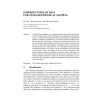Free Online Productivity Tools
i2Speak
i2Symbol
i2OCR
iTex2Img
iWeb2Print
iWeb2Shot
i2Type
iPdf2Split
iPdf2Merge
i2Bopomofo
i2Arabic
i2Style
i2Image
i2PDF
iLatex2Rtf
Sci2ools
113
click to vote
IFIP
2004
Springer
2004
Springer
Imperfectness of Data for STS-Based Physical Mapping
In the STS-based mapping, we are requested to obtain the correct order of probes in a DNA sequence from a given set of fragments or equivalently a hybridization matrix A. It is well-known that the problem is formulated as the combinatorial problem of obtaining a permutation of A’s columns so that the resulting matrix has the consecutive-one property. If the data (the hybridization matrix) is error free and includes enough information, then the above column order determines the correct order of the probes uniquely. Unfortunately this is no longer true if the data include errors, which has been one of the popular research targets in computational biology. Even if there is no error, ambiguities in the probe order may still remain. This in fact happens by the lack of some information of the data, but almost no further investigation was made previously. In this paper, we define a measure of such imperfectness of the data as a minimum amount of additional fragments which are needed to fi...
| Added | 02 Jul 2010 |
| Updated | 02 Jul 2010 |
| Type | Conference |
| Year | 2004 |
| Where | IFIP |
| Authors | Hiro Ito, Kazuo Iwama, Takeyuki Tamura |
Comments (0)

